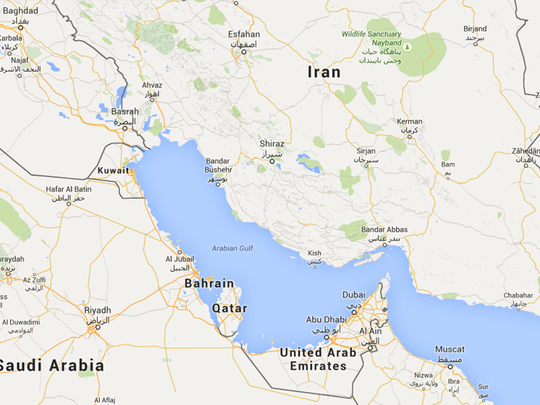
Dubai: While people in Iran and the Arab Gulf states are still in disagreement over what to call the body of water between them, Google has created a tricky mechanism to approach the problem.
Arab countries insist that the territory should be called Arabian Gulf while the Iranians argue that it should be called 'Persian Gulf'. The area in question had been called Persian Gulf until a few decades ago, when Arabs put forward the call to change it.
To avoid getting entangled in a geopolitical mess, Google, whose mapping service enjoys the largest readership in the world, decided to show people from the Arab Gulf states one thing, and the Iranians and the rest of the users, another.
In other words, Google Maps has at least two different versions of the fiercely contested area, so that when users from countries like the UAE search for the world map, what they see is Arabian Gulf. But everywhere else, however, what is shown primarily is still Persian Gulf.
A Google search for the world map using the domain for users in the UAE, for instance, shows the waterway labelled as Arabian Gulf.
But if someone does the same search using a different domain, say, United Kingdom (www.google.co.uk/maps) or France (www.google.fr/maps), what is immediately visible is 'Persian Gulf'. The user has to zoom in to be able to see Arabian Gulf, written in parentheses, below the 'Persian Gulf'.
So, while the maps and politics geeks in the UAE or Arab countries think that the site is now called Arabian Gulf in Google Maps, most people outside the region still believe otherwise.
Google justifies its action by saying it is merely trying to be “consistent with the names people use locally to describe geographic areas.”
“While many users and maps refer to the Persian Gulf, some users also refer to it as the Arabian Gulf. To respect that difference of opinion, we show Persian Gulf across all our domains with Arabian Gulf visible below in parentheses, and then serve Arabian Gulf to Arabic country domains,” a spokesperson told Gulf News.
Does this mean Google considers 'Persian Gulf' as the most widely used name?
“Yes. In such cases, the primary, global name is the name most commonly and globally applied to the feature across a wide variety of cartographic publishers and third-party authorities,” the spokesperson said.
Analysts said that Google has been using the same approach when dealing with geo-politically sensitive areas.
“It customizes the maps by presenting different versions of a disputed area. This way, it avoids offending the opposing factions,” said one IT analyst in Dubai.
Alexandra Pisetskaya of Help AG, an information security services and solutions provider, said that organisations like Google don’t take sides in cases where no consensus has been reached.
“Companies, especially global players such as Google, can’t be expected to take a political stand as it could adversely impact their business. With a service such as Google Maps, however, there is scope for hurting a nation’s sentiment – as evident in this particular case,” Pisetskaya told Gulf News.
“I think Google is wise in tweaking the service as per the domain of the user as the other alternative would be to avoid marking disputed territories which in turn would of course diminish the effectiveness of the service.”








